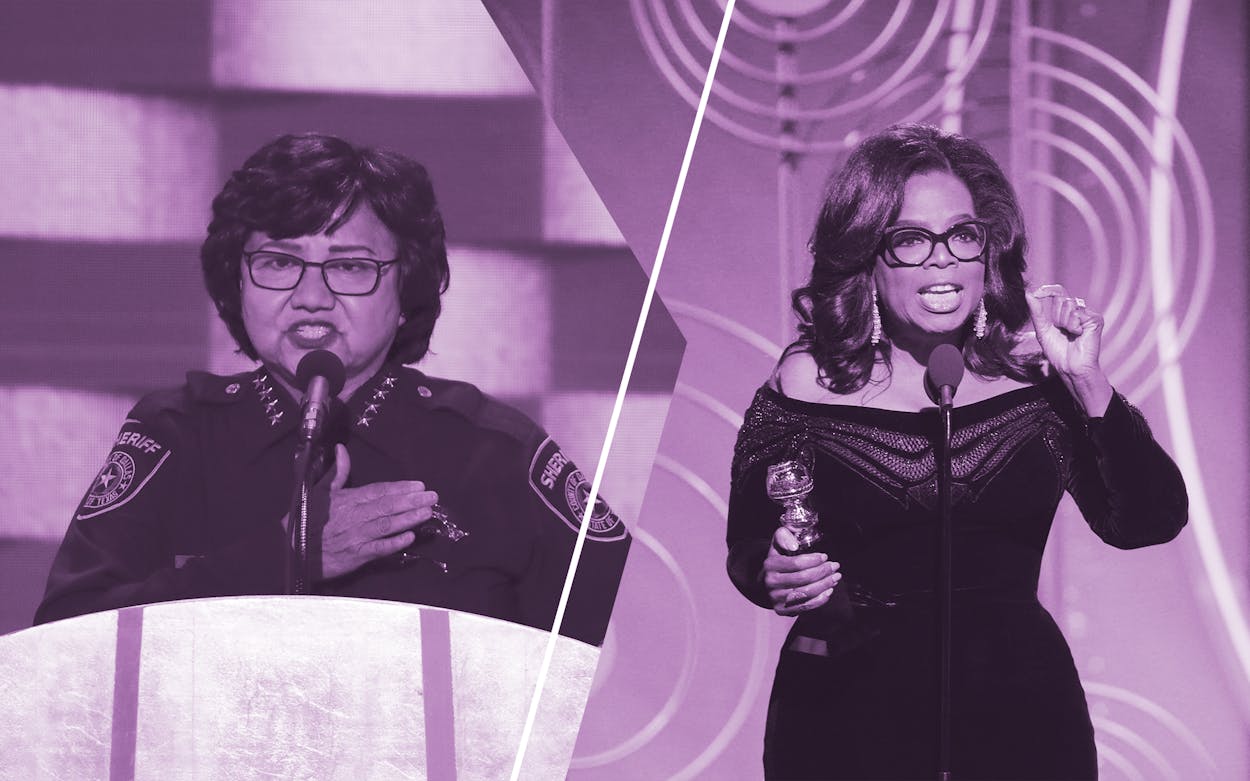During her run for Texas governor in 1990, Ann Richards invoked the theme of bringing about a New Texas, where cronyism and good-old-boyism were things of the past and women and minorities could take the reins of power. She was 55 when she ran, and the last time a woman had won the governor’s office was the year that Richards was born, in 1933. “I know what it is like to find the door closed to you,” Richards told a church congregation on the Sunday before the Democratic primary. “Not because of the color of my skin, but the fact that I was born female.”
Richards won the governorship that year, but her vision of a New Texas lasted just a single term; she lost re-election to George W. Bush four years later. Republican Kay Bailey Hutchison also won statewide election as treasurer in 1990 and went on to serve almost two decades as one of the state’s U.S. Senators. The number of elected women grew in the intervening years, but today, women still only represent a quarter of the elected officials in America.
This year, a record number of women are running for office in Texas. Most have jammed into crowded Democratic primary contests, and many of the candidates will never reach the general election where most Texans vote. But on Sunday, two women launched campaigns—kind of—that could have a significant impact in Texas. Former Dallas County Sheriff Lupe Valdez officially announced as a Democratic candidate for governor, and the calls for Oprah Winfrey to run for president in 2020 officially began.
Valdez’s formal campaign kick-off was not unexpected. She had announced her intent to seek the Democratic nomination and challenge Governor Greg Abbott months earlier, and while she may not be the favorite for the nomination, she’s definitely a serious contender. Valdez grew up in San Antonio, the daughter of migrant farm workers from Mexico. In 2004, Dallas County voters elected her sheriff, making her the first openly gay candidate, and the first Hispanic woman, to win that office in the state’s history. She’s also the only one of ten Democratic candidates running for governor who has won a major election.
Like Ann Richards, Valdez turned to the New Texas theme in her Sunday speech in Dallas:
Our children are crammed in overcrowded classrooms. Working Texans need a raise. Our roads and bridges need serious investment. And our healthcare system faces uncertainty. Yet, the special interests in Austin continue to cook up fake issues behind the curtain.
You remember the Wizard of Oz, where it was all a charade. [The state’s leaders] have made up issues—bathrooms, sanctuary cities, massive voter fraud, Jade Helm. It would be amusing if it wasn’t causing so much harm, costing us jobs, and certainly destroying the Texas brand.
Ya basta. Enough with the hate and the bickering. We need to build something new. A new Texas.
If Richards in 1990 was an underdog, Valdez will have to tunnel out from a cave to reach the Governor’s Office. Richards had the obstacle of running as a woman, but the state still leaned in favor of Democratic candidates. While she could never match the spending of her opponent, millionaire Republican Clayton Williams, Richards never wanted for a lack of financial resources. Plus, Richards was nationally known from her keynote address at the Democratic National Convention in 1988. Valdez does not have the luxury of either.
Winfrey, on the other had, has been a national celebrity for decades. Her speech at the Golden Globes ceremony on Sunday, as she accepted a lifetime achievement award, prompted an outcry for her to run for president in 2020. By early Monday, some news organizations were reporting that she was seriously considering it. But could Oprah translate her celebrity into a presidential campaign as Trump did?
A survey conducted by Public Policy Polling last March found that Winfrey had a 49 percent positive favorability rating nationally, and, if an election had been held then, she would have defeated Trump with 47 percent of the vote. Clinton, of course, defeated Trump with 48 percent in the popular vote, but Trump still won the White House through the Electoral College. Trump also won three states that had been carried by Obama—Florida, Ohio, and Michigan—in no small part because African-American voter turnout was down.
But an Oprah for President campaign in 2020 could make the Democrats competitive in both the popular vote and the Electoral College and could help some down ballot candidates in Texas. Statewide, African-American voters typically account for a little over twelve percent of the total voter turnout. In 2008, President Obama received 98 percent of that vote, but he still lost the state. The African-American vote in Texas has dropped steadily since, and it fell by 3,000 votes between 2012 and 2016.
There are almost three million African-Americans living in Texas, primarily in Harris County, the DFW area, and along the Interstate 35 corridor from San Antonio to Austin. So while a Winfrey candidacy is not likely to turn the state any more than Obama did, she could help Democrats carry the urban counties, and perhaps Fort Worth and Tarrant County for the first time in years.
This article has been updated to reflect the following correction: Lupe Valdez has, in fact, made the ballot for the Democratic primary.
- More About:
- Politics & Policy
- Lupe Valdez
- Ann Richards






